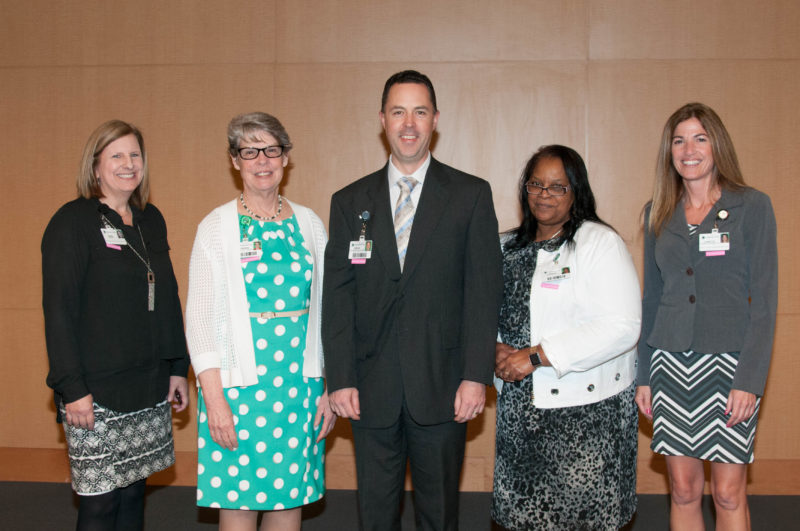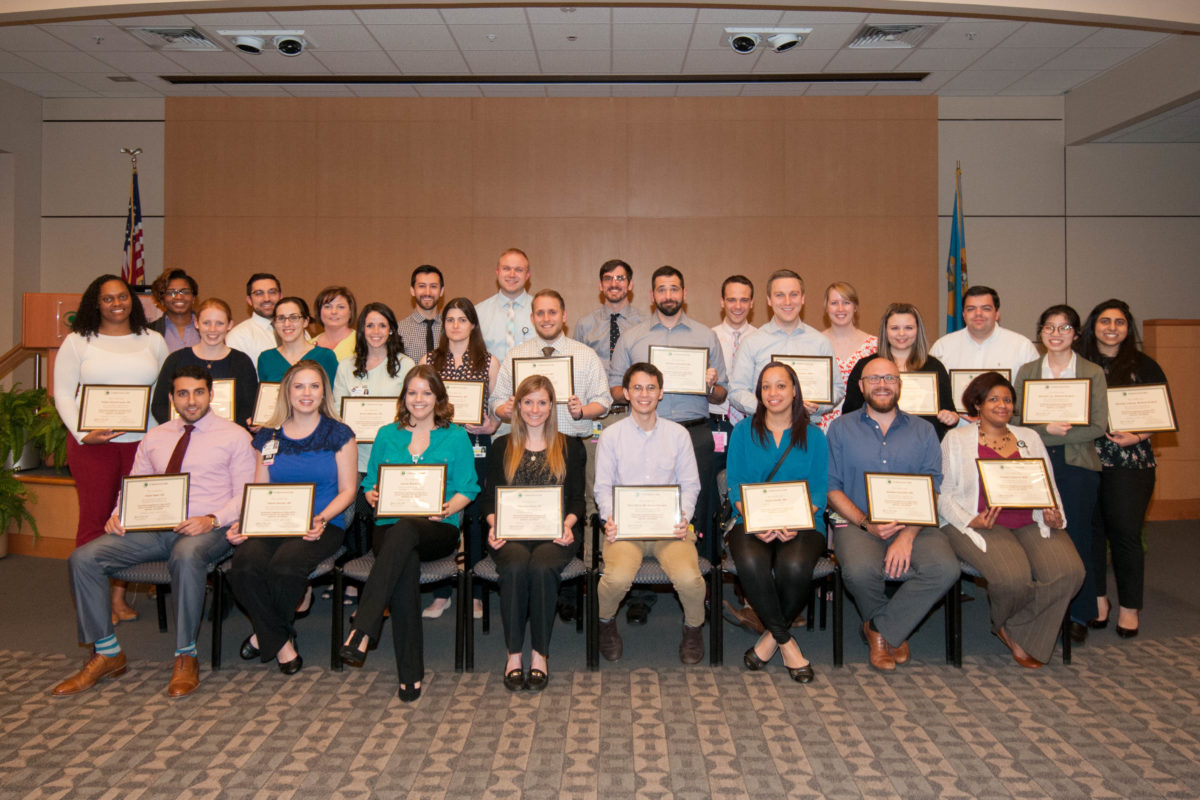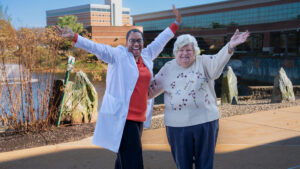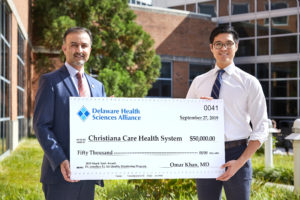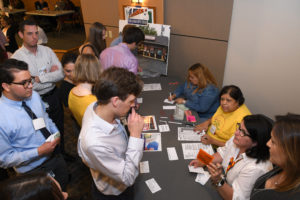Achieving Competency Today: Issues in Health Care Quality, Cost, Systems, and Safety (ACT), one of Christiana Care’s leading graduate-level improvement science courses combining experiential learning and outcomes analysis, held its winter graduation April 5 at the John H. Ammon Medical Education Center.
“Creating successful change is built on relationships, which leads to teams, which leads to shared vision— and that’s what you are doing,” said Omar Khan, M.D., MHS, FAAFP, Service Line physician leader, Primary Care and Community Medicine to the graduating learners. “We must improve. We must add value. Your action changes things.”
Neil Jasani, M.D., MBA, FACEP, vice president, Medical Affairs, and chief learning officer, congratulated the ACT program teams for advancing The Christiana Care Way through their systematic, interprofessional team approach to problem solving. He thanked the program facilitators for skillfully guiding the teams on their improvement journeys.
“The best thing about ACT is the ability to engage in interprofessional teamwork,” Dr. Jasani said. “We have a strong commitment to develop our extraordinary people, and we encourage you to use the knowledge and skills you have learned to help create innovative, effective, affordable systems of care.”
As part of the ceremony, the four graduate teams presented their projects:
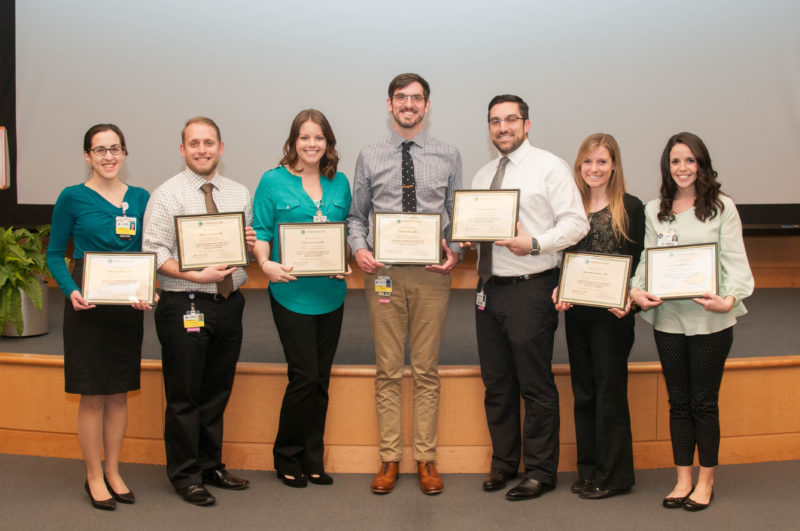
Goals of Care: Do We Know Our Patient’s Wishes?
This project aimed to increase and sustain documentation and knowledge of goals of care by 50 percent for Christiana Care Hospitalist Partners inpatients on Acute Care of the Elderly Unit 6A within 24 hours of arrival to unit by April 2017. The overall goal was to assure that clinical team members can accurately identify their patients with limitations of treatment as well as patients for whom goals-of-care discussions need to take place. By engaging unit-based champions, integrating separate workflows for nurses and physicians and standardizing communication of goals-of-care status in nurse report, charge nurse report, interprofessional rounds and with individual hospitalists, goals-of-care documentation increased from 13 percent pre-intervention to 53 percent post-intervention.
Team members included Jordan Assadi, D.O., Nicole DiBattista, RN, Michael Farrell, M.D., Dana Marchetto, D.O., Rebecca Martz, M.D., Andrew Tee, M.D., and Lauren Warren, RN.
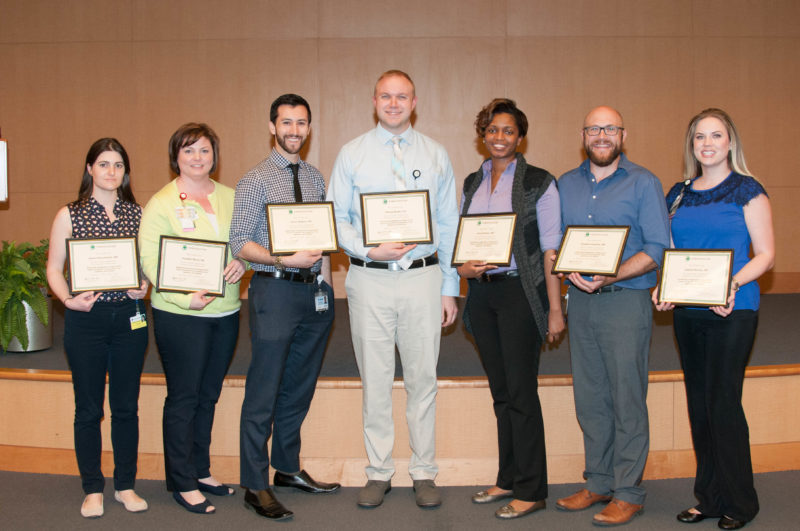
Lost in Translation: Improving Interpreter Utilization Documentation
This project was designed to increase the rate of appropriate documentation of interpreter use with limited English proficiency patients by Emergency Medicine residents to 35 percent in two weeks.
According to Christiana Care policy, appropriate documentation means recording the language spoken, the in-person interpreter’s name, or the interpreter identification number for phone or video use in the patient’s chart. Pre-intervention, Emergency Medicine residents self-reported documenting use of interpreters 64 percent of the time. A pre-intervention chart review revealed that EM residents appropriately documented use of an interpreter only 10 percent of the time. The results of the team’s intervention increased appropriate documentation to 40 percent for EM residents. This was accomplished by providing information about how to appropriately document interpreter use to the EM resident physicians, placing purple “interpreter required” signs on the doors of patients identified as LEP, and attaching reminder signs and pre-printed notes to all the Cryacom (blue) phones
Team members included Tobias Banks, D.O., Stephen Donnelly, M.D., Sarah Himmelstein, M.D., Scott Holmes, D.O., Valerie Perrine, RN, Ania Rodney, M.D., and Jennifer L. Shiuh, MSN, MBA, RN, PCCN, CEN.
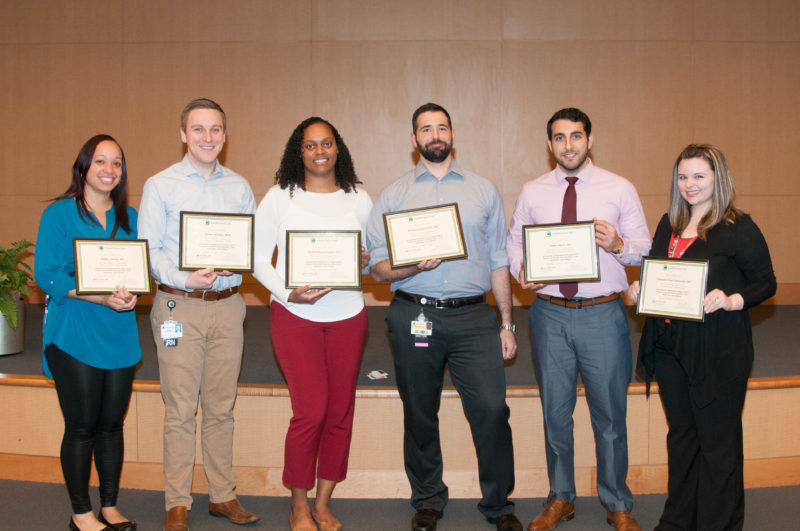
Trauma T for IV
The “Trauma T for IV” team sought to improve trauma team members’ ease of obtaining IV access during trauma alerts/codes at Christiana Hospital by 25 percent by March 23, 2017.
Pre-implementation surveys and direct observation revealed that one of the most common problems during traumas was workflow inefficiency to gain IV access, which is crucial for diagnostic testing, resuscitation and administration of medications. The team found that IV access was often delayed because of room crowding, position of the patient and role clarity. With the support of the Emergency Department’s trauma physicians and nurses, the team implemented, when feasible, repositioning a patient’s arm to a “T” position during transfer from the ambulance stretcher. This 90 degree repositioning of the patients’ arms allowed easier and faster access to extremities for IV insertion, which facilitated optimal care.
Team members include Tamer Amer, D.O., Courtney Cruz-Castaneda, BSN, RN-BC, DeLea Jacobs, BSN, RN, Trisha Pascall-Lopez, D.O., Nicholas Rosenfeld, M.D., and James Thomas, MSN, RN.
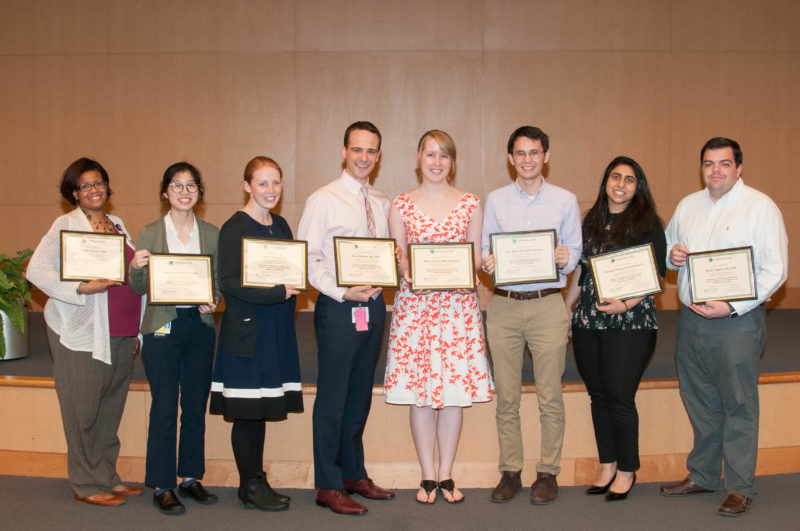
HOST: Health Outreach Service Team
The HOST team complemented a larger health system and prior ACT team effort to engage a population of underserved homeless adults (age 55 and older) who use St. Patrick’s community center to better manage their hypertension, diabetes or mental health.
They began by learning about the specific health needs of this population, performing personal interviews with patrons as part of an ongoing community health needs assessment. Knowing that lack of access to healthy food is associated with poor outcomes in virtually every area, the team hosted a lunchtime healthy food session on March 15. Approximately a dozen patrons participated and shared their challenges with access to and perceptions surrounding healthy food. Every patron interviewed stated interest in formal education sessions on dedicated health topics. This session provided important information to build from to guide future interventions.
Secondary goals included improving access to health services by providing connections to appropriate primary and community care services, and increasing the number of opportunities for community health experiential rotations for medical students and residents by July 2017.
Team members include Evan Bilheimer, M.D., Peter Block, Tenisha Cameron, MHA, Kelsey Capron, Michelle D’Souza, Michelle Lee, Michael Maguire, M.D., and Avalon Mertens, D.O.
